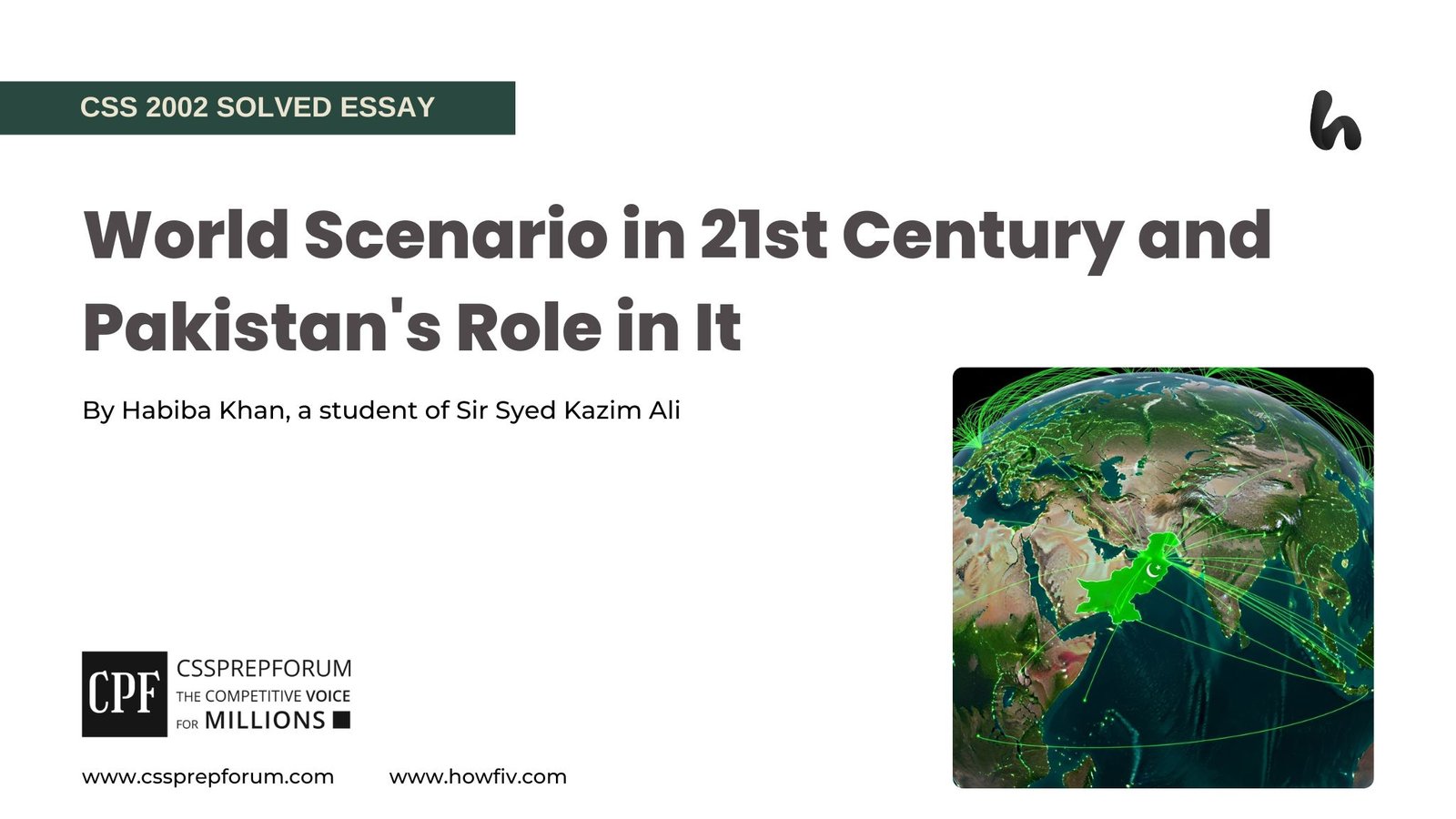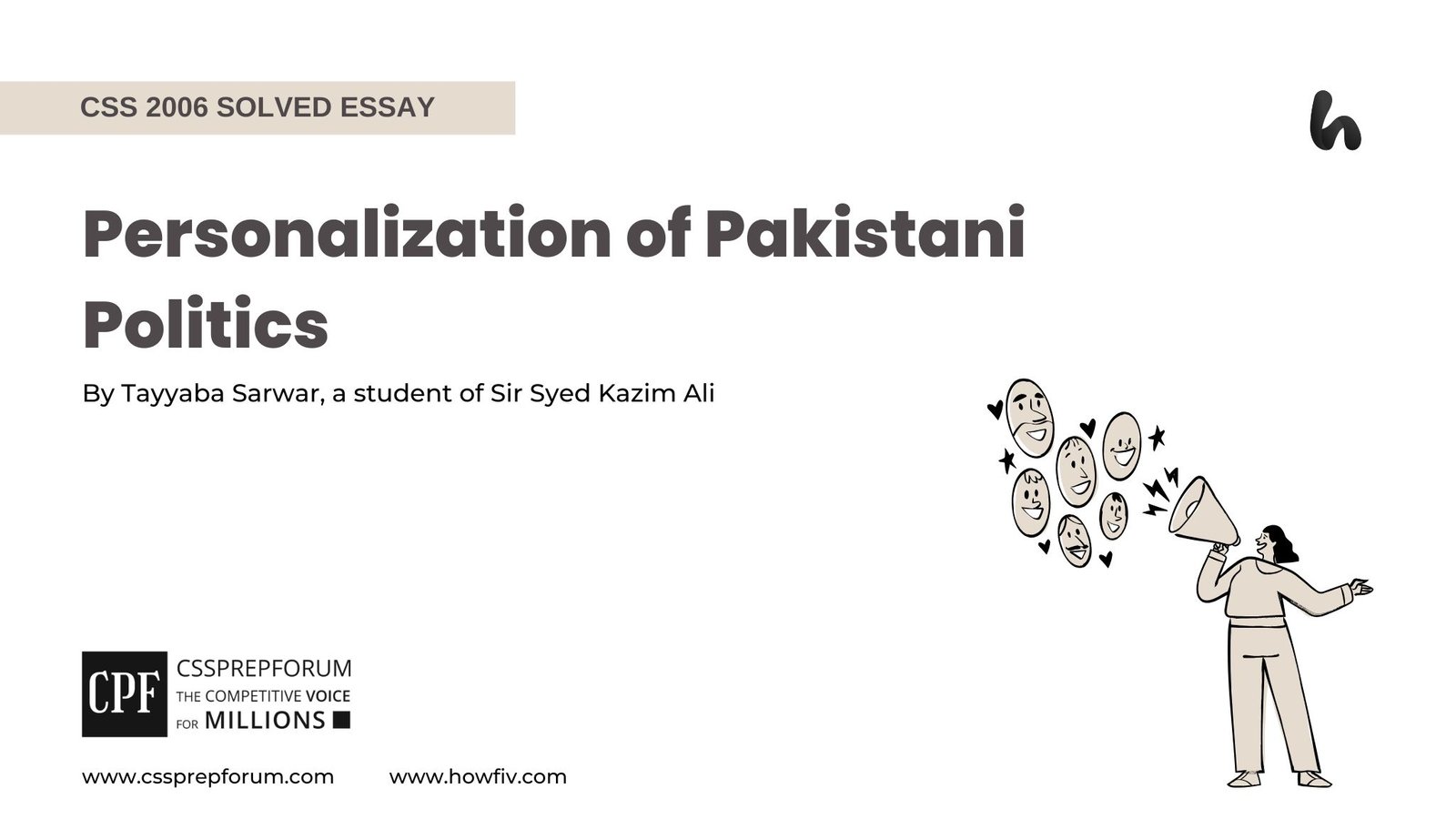CSS 2019 Solved Islamiyat Past Papers | The Moral Values of Islamic Civilization.
The following question of Islamiat is solved by Miss Ayesha Irfan, the highest scorer in CSS Islamiat. Moreover, the question is attempted on the same pattern taught by Sir Syed Kazim Ali to his students, scoring the highest marks in compulsory subjects for years. This solved past paper question is uploaded to help aspirants understand how to crack a topic or question, how to write relevantly, what coherence is, and how to include and connect ideas, opinions, and suggestions to score the maximum.

Question Breakdown
In this question, the examiner asked about how the framework of moral values system under the Islamic ideology is significant for the society as a whole. However, to gain high scores, one must provide Islamic moral standards from the Holy Quran and Sunnah e Rasool (PBUH) to highlight every stance concerning these. In this question, after the introduction, briefly discuss Islamic civilization and then discuss the importance of these moral values in spheres of life.
Outline
1-Introduction
2-What is meant by Islamic civilization?
3-How the moral values system of Islam as a significant feature of Islamic Civilization
A-Islamic moral values for societal improvements
- ✓Justice and legitimacy
- According to the Holy Quran, Surah Al Nisa (Ayat 135), “O you who have believed, be persistently standing firm in justice, witnesses for Allah, even if it be against yourselves or parents and relatives.”
- ✓Honesty and truthfulness
- According to the Holy Quran, Surah Al Ahzab (Ayat 70) “O you who have believed, fear Allah and speak words of appropriate justice.”
- ✓Compassion and mercy
- According to the Holy Quran, Surah Al Anbia (Ayat 170), “And We have not sent you, [O Muhammad], except as a mercy to the worlds.”
- ✓Forgiveness and absolution
- According to the Holy Quran, Surah Ash-Shura Ayat 40), “The recompense for an injury is an injury equal thereto; but if a person forgives and makes reconciliation, his reward is due from Allah.”
- ✓Charity and serving the public
- According to the Holy Quran, Surah Al Baqarah Ayat 177, “Righteousness is not that you turn your faces toward the east or the west, but [true] righteousness is in one who believes in Allah…and gives his wealth, in spite of love for it, to relatives, orphans, the needy…”
B-Islamic values for developments in Trade and Business
- ✓Fairness and honesty in trade
- According to the Holy Quran, Surah Mutaffifin Ayat 1-3), “Woe to those who give less [than due], who, when they take a measure from people, take in full. But if they give by measure or by weight to them, they cause loss.”
- ✓Prohibition of interest and fairness in transactions
- According to the Holy Quran, Surah Al Imran Ayat 130), “O you who have believed, do not consume interest, doubled and multiplied, but fear Allah that you may be successful.”
- ✓Prohibition of hoarding and monopolies
- According to the Holy Quran, Surah At Tauba Ayat 34), “…And those who hoard gold and silver and spend it not in the way of Allah – give them tidings of a painful punishment.”
- ✓Fulfillment of contracts and trust
- According to the Holy Quran, Surah Al Maida Ayat 1), “O you who have believed, fulfil [all] contracts…”
C-Governess and leadership teachings according to Islamic values
- ✓Principles of shura
- According to the Holy Quran, Surah Ash-Shura Ayat 38), “And those who have responded to their lord and established prayer and whose affair is [determined by] consultation among themselves…”
- ✓Accountability
- According to the Holy Quran, Surah Al Nisa (Ayat 135), “O you who have believed, be persistently standing firm in justice, witnesses for Allah, even if it be against yourselves or parents and relatives. Whether one is rich or poor, Allah is more worthy of both. So follow not [personal] inclination, lest you not be just.”
- ✓Humility in leadership
- According to the Holy Quran, Surah Luqman (Ayat 18), “And do not turn your cheek [in contempt] toward people and do not walk through the earth exultantly. Indeed, Allah does not like everyone self-deluded and boastful.”
- ✓Welfare of people
- According to the Holy Quran, Surah An Nahl (Ayat 90), “Indeed, Allah commands you to uphold justice and to do good to others and give to relatives. And He forbids immorality, bad conduct, and oppression.”
4-Conclusion

Answer to the Question
Introduction
In the last 14 centuries, Islamic civilisation has emerged as the most persuasive and enduring civilisation on the map of the world, which influences the world culturally, politically, socially, and above all, economically. In the roots of civilisation, moral values lie according to the teachings of the Holy Quran and Sunnah e Rasool (PBUH) that establish the righteous precinct and spirituality in society. Meanwhile, the comprehensive framework of the ethical system of Islamic values addresses the individual as well as the collective conduct of living beings. It emphasises the core values for instrumental uplift through social, political, and trading improvements. Correspondingly, the core values in the teachings of the Holy Quran and the Prophet (PBUH) shape mankind towards peace, justice, legitimacy, forgiveness, friendship, fairness, accountability, and social welfare in all spheres of life. However, in this contemporary world, the Islamic civilisation has been facing encounters since the downfall of Muslims socially, culturally, and ethically. In modern ages, extremism in Muslim communities has misinterpreted the Islamic laws that bring hurdles in the way of Muslims. In this article, the significance of Islamic moral values and the challenges faced by Islamic civilisation have been discussed.
What is meant by Islamic civilization?
The basis of Islamic civilization is founded on two main principles: the oneness of God and the oneness of humanity. Civilization is not associated with a specific region, race, or historical era; it has universal and pluralist dimensions. It addresses the well-balanced relation between spiritual and material life and thought moderation to mankind with no extremism, no neglect, no excess, and no recklessness. Moreover, it is driven by two primary sources: the Holy Quran and the Holy Prophet (PBUH). The sources provide the blueprints for individual behaviour, societal norms, economic practices, and interpersonal relations. In the Holy Quran, the Almighty said,
“Thus we have appointed you a mid-most nation, and you may be witnesses upon mankind.”
The foundations laid by the Holy Quran and the teachings of the Prophet (PBUH) on moral values have driven the Muslim communities towards peace, prosperity, and progress. Meanwhile, the holy Quran gives guidance on integrity, humility, righteousness, justice, truthfulness, and honesty to uplift mankind. Similarly, the Sunnah e Rasool gives practical demonstrations and implementations of the teachings of the Holy Quran. He emphasised moral values, which turn out to be the cornerstones of Islamic civilisation, for instance, forgiveness, humility, compassion, consultation, justice, trustworthiness, and kindness.
How moral values system of Islam is significant for Islamic civilization?
- Islamic moral values for societal improvements
Next to it, the moral values engraved in Muslims by the teachings of the Holy Quran and the practical life of the Holy Prophet (PBUH) have significant implications for societal developments. First, justice is the key moral value on which the foundation of Islamic civilisation stands. The famous saying of the Holy Prophet (PBUH) about the lady of Banu Makhzom, who committed theft and wished for relief based on the popularity and wealth of her tribe, highlights the significance of justice in Islamic ideology. Moreover, in the Holy Quran, the Almighty has mentioned several times, like in
“O you who have believed, be persistently standing firm in justice, witnesses for Allah, even if it be against yourselves or parents and relatives.”
Surah Al Nisa (Ayat 135)
Also, in the Rashidun caliphate, there are numerous illustrations of justice and legitimacy; for instance, the establishment of courts and appointments of judges to address the grievances of the public for societal equilibrium has highlighted its noteworthiness. Second, two key sources of instruction and guidance always emphasize honesty and truthfulness as mentioned in
“O you who have believed, fear Allah and speak words of appropriate justice.”
Surah Al Ahzab (Ayat 70)
The Uswah e Husna of the Holy Prophet (PBUH) proved him as “Sadiq and Amin”, the title given by Quraish e Makkah. Compliance, in the social arena, honesty and truthfulness have emerged as of great worth in avoiding corruption and maintaining public trust, and they elaborate on the credibility of leadership and administration.
Similarly, the people who entered into the fold of Islamic civilization have secured the progression in every aspect of life as well as life thereafter through its structure of moral values. In society, compassion and mercy from the influential are mandatory for the progression of equality and for the welfare of societies to be prioritized. As mentioned in
“And We have not sent you, [O Muhammad], except as a mercy to the worlds.”
Surah Al Anbia (Ayat 170)
The Quranic verse shows the importance of mercy on the world. The Islamic laws for forgiveness and reconciliation to maintain harmony and resolve conflicts also highlight its importance for societal improvements. On social grounds, to alleviate poverty and societal discrimination, Islamic civilization has also accentuated the power of charity and public serving.
“Righteousness is not that you turn your faces toward the east or the west, but [true] righteousness is in one who believes in Allah…and gives his wealth, in spite of love for it, to relatives, orphans, the needy”.
Surah Al Baqarah Ayat 177
All these moral values of Islam prove that the well-being of mankind and the growth of a healthy society is necessary in the light of its pearls of wisdom.
- Islamic values for developments in Trade and Business
Additionally, the significance of moral values in Islamic civilization can also be determined by Islamic principles for trade and business. The Holy Quran and Sunnah of the Holy Prophet (P.B.U.H) have emphasized morality in all business. The argument is well supported by the Quranic Surah Al-Muttafifin, in which ayah no. 13 fosters fairness in measurement and harshly criticizes the short measures. The ayah proves the fact that every Muslim is bound to be fair when it comes to measure. Furthermore, for the proper development of trade and business in Islamic society, Allah Almighty has banned the curse of the interest system, engulfing the peace, prosperity, and stability of the common people. According to Allah the Almighty, the interest system has been prohibited, and believers are commanded to fear God.
“O you who have believed, do not consume interest, doubled and multiplied, but fear Allah that you may be successful.”
Surah Al Imran, Ayat 130
Apart from this, for progressive trading and business, Islam has not only emphasized the fulfilment of contract and trust -as per Surah Al-Maida, Ayat no. 1, “O you who have believed, fulfil [all] contracts…”- but also has strictly forbidden hoarding and monopolies. Surah At Tauba, Ayat 34, “…And those who hoard gold and silver and spend it not in the way of Allah – give them tidings of a painful punishment”, openly gives priority to trustworthiness and abiding by gluttony and selfishness to condemn social ills in the world. Islamic civilization is for all humanity, taking care of every living being without any disparity and promoting the maintenance of market equilibrium, the prevention of economic disparities, and the availability of goods for all. Thus, all the above facts and proofs highlight that the moral value system of Islam has purified trading and business in Islam for the betterment of Islamic ideology.
- Governess and leadership teachings according to Islamic values
Subsequently, Islamic civilization further elaborates on the connotations of the moral values system for governance and leadership to establish a sense of legitimization in society. Holy Quran and Uswa e Rasool (PBUH) teach us the principles of shura to avoid misuse of power and suppression of common people. According to
“And those who have responded to their lord and established prayer and whose affair is [determined by] consultation among themselves.”
Surah Ash-Shura Ayat 38
Second, accountability in public affairs to get rid of immorality and delinquency is a key value of Islamic principles to assure meritocracy. As per
“O you who have believed, be persistently standing firm in justice, witnesses for Allah, even if it be against yourselves or parents and relatives. Whether one is rich or poor, Allah is more worthy of both. So, follow not [personal] inclination, lest you not be just.”
Surah Al Nisa (Ayat 135)
Islamic moral values enforce transparency and just acts in leadership and governance affairs to fulfil the concerns of common people without any discrimination. Besides, the hadith of Sahih Al-Bukhari underscores that individuals are responsible for the doings of their flock.
Along with it, Uswa e Rasool (PBUH) has examples of humility as guided by the Holy Quran in
“And do not turn your cheek [in contempt] toward people and do not walk through the earth exultantly. Indeed, Allah does not like everyone self-deluded and boastful.”
Surah Luqman (Ayat 18)
The sense of humility and recognition for the community is engraved in the basis of Islamic values for the betterment of the society, as the first speech of the first Caliph of Islam, Hazrat Abu Bakar, in which he called himself the servant of his subject, shows the importance of humility towards common people. Furthermore, throughout his life, the Prophet (PBUH) reiterated social welfare through every action and forbade immorality, bad conduct, and oppression. Thus, every argument has proved the Islamic structure as a complete code of social, political, cultural, ethical, and economic betterment that provides an inclusive framework for the evolution of a vigorous social order.
Conclusion
The moral values of Islam and the teachings of the Holy Quran and Holy Prophet (PBUH)- justice, peace, trustworthiness, truth, equality, humility, accountability, and forgiveness- have had a profound impact on the structure and context of Islamic civilization. These are not only the conduct of individual up gradation but are also the ethical backbone of society, politics, economy, and governance. However, the obstacles faced by the Islamic community have jeopardized the core foundations of Islamic ideology and shattered the fabric of Muslim harmony. Nowadays, the Western world has taken advantage of Muslims’ weaknesses, ruling the world and manipulating Muslims. Yet, as the end of every darkness always has a beginning of light, by fostering these moral values like social harmony, ensuring justice, promoting accountability, and fulfilling honesty, the Muslim world can also flourish and grow in modern times.
CSS Solved Past Papers’ Essays
Looking for the last ten years of CSS and PMS Solved Essays and want to know how Sir Kazim’s students write and score the highest marks in the essays’ papers? Then, click on the CSS Solved Essays to start reading them.
CSS 2019 solved Past Paper
Searching for CSS or PMS Solved Islamiat Past Papers?
Are you preparing for CSS or PMS and searching for solved Islamiat past papers, notes, books, PDFs, and MCQs? Explore them for free on Howtests and Cssprepforum. All content is fully solved and written by Miss Ayesha Irfan. For your convenience, the links are provided below, simply click on any to start reading and preparing.












